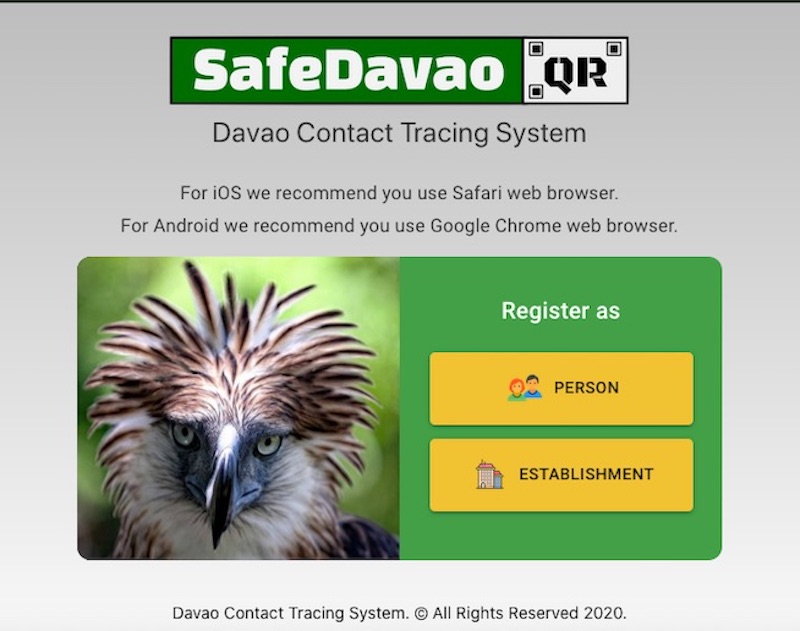
DAVAO CITY (MindaNews / 9 November) – The local government is set to reopen the registration for the “Safe Davao QR” (DQR) system on Wednesday, a week after thousands of registrants flooded the website causing it to crash.
During her live interview over Davao City Disaster Radio (DCDR 87.5) on Monday, Duterte said, however, that the resumption would be exclusive only for business establishments in the city.
The registration link for establishments would be released first thing on Wednesday, she added.
She said the local government would make a separate announcement once the registration for individuals reopens.
The “Safe Davao QR” system, which is made available to residents, non-residents, and establishments including all private and government offices, has been launched to hasten the contact-tracing system and prohibit non-essential movement of the people within the city in an effort to put the spread of the coronavirus disease (COVID-19) infection under control, according to her.
Duterte said that separate registration links would be provided for business establishments and individuals to avoid overwhelming the website.
The previous DQR system website, https://safedavaoqr.davaoct.com, was taken down three days before the supposed mandatory enforcement last November 7.
The mandatory enforcement of the DQR system has been moved to November 23 to give more time for Dabawenyos to secure their personal DQR codes.
Around 360,000 business establishments and individuals have been registered from the start of the registration on October 31 until it crashed four days later, according to the mayor.
She said that those who have been registered in the system will no longer have to re-register for another DQR code.
Duterte said the city would also release a list of establishments and offices that are required to participate in the system.
“We will release a general list of establishments if they need to scan or not, and then we will have the doctors check it because what we are tracing are the close contacts – F1, F2, F3,” she said.
Persons who are classified as F1 are the close contacts of the confirmed COVID-19 positive, F2 are close contacts of F1, and F3 are close contacts of F2, she said.
Duterte said the department heads of the City Hall of Davao have been instructed to prepare scanners for their respective offices.
Business establishments could use their mobile phones to scan the DQR codes, she said.
To register through the link, the people must provide a clear photo of the entire face, facing the camera; a clear photo of their valid ID or birth certificate (a list of valid IDs is provided below); a clear photo of their face beside the valid ID or birth certificate; a valid mobile phone number; and, a valid email address.
The list of valid IDs are Social Security System / Government Service Insurance System, Unified Multi-Purpose Identification Card; Land Transportation Office Driver’s License (student permit may be accepted if in card format); Professional Regulatory Commission ID; Overseas Workers Welfare Administration / Integrated; Department of Labor and Employment (iDOLE) card; Commission on Elections Voter’s ID or Voter’s Certification from the Election Officer with Dry Seal; Philippine National Police (PNP) Firearms License; Senior Citizen ID; Airman License (issued August 2016 onwards); Philippine Postal ID (issued November 2016 onwards); School ID; Passport; and In the absence of a valid ID, PSA copy of a birth certificate.
The local government said those city residents who do not have a valid ID or birth certificate may apply for their DQR at the nearest police station while non-Davao City residents who do not have a valid ID or birth certificate must first get these requirements before they can register for a DQR. It said employers should assist all their workers who do not know how to go online or do not own a smartphone.
As of November 8, the Department of Health-Davao Region reported a total of 6,487 COVID-19 cases with 1,885 active, 4,372 recoveries and 230 deaths.
Of this total, the DOH-Davao reported that 4,476 were in Davao City, 344 in Davao de Oro, 692 in Davao del Norte, 488 in Davao del Sur, 107 in Davao Occidental, and 380 in Davao Oriental.
